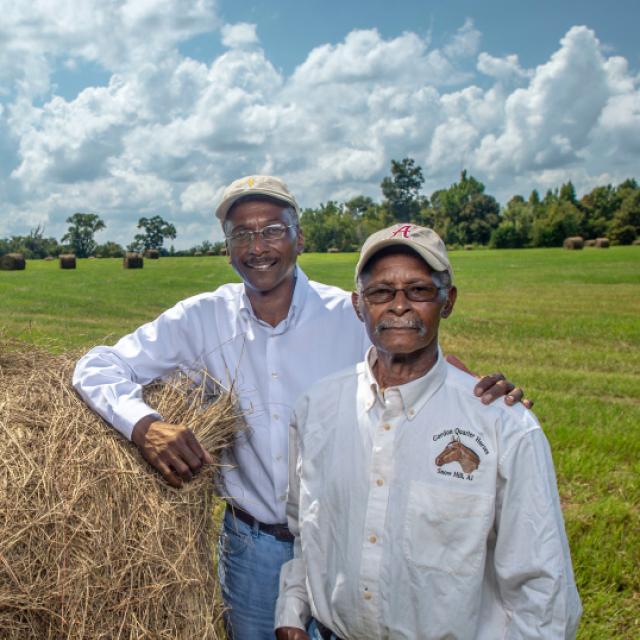
Press Release


Conservation Innovation Grants (CIG) is a competitive program that supports the development of new tools, approaches, practices, and technologies to further natural resource conservation on private lands.
Through creative problem solving and innovation, CIG partners work to address our nation's water quality, air quality, soil health and wildlife habitat challenges, all while improving agricultural operations.
There are three annual Conservation Innovation Grants funding opportunities:
National competition for projects that support the early-stage development and piloting of new tools, practices and technologies to further natural resource conservation on private lands.
National competition for projects that support more widespread adoption and evaluation of innovative conservation approaches in partnership with agricultural producers. On-Farm Trials Awardees provide technical assistance and incentive payments to producers to help compensate for risks associated with implementation of new conservation practices, systems and approaches. Awardees also evaluate the environmental, financial and social (to the extent possible) impacts of implementing innovative approaches. The Soil Health Demo Trial is a priority within the On-Farm Trials competition which focuses exclusively on implementation of conservation practices and systems that improve soil health.
State-level competitions for projects that support early-stage development and piloting of new tools, practices and technologies to further natural resource conservation on private lands. While the overall goal and approach match those of CIG Classic, CIG state competitions fund projects that target state-identified conservation priorities. Each year, NRCS state offices may elect to administer their own CIG competitions. State CIG competitions are announced separately from national competitions.

Since its inception in 2004, CIG has funded hundreds of projects, boosting natural resource conservation while helping producers improve the health of their operations for the future.

Information for applicants on the CIG program and how to apply.

Information for grantees who have been awarded funding for a CIG project.

CIG is making an impact across the country
New Jersey announces funding opportunities for the state component of CIG on Grants.gov every other year. The CIG State Component offers eligible entities the opportunity to apply for grants for eligible projects within the state. Interested applicants may review projects funded in prior years to see what has been successful in the past.
A webinar for potential applicants of the FY23 CIG funding opportunity can be viewed here.

Find out what projects were successful in obtaining CIG funding in the past.
NRCS has established a webinar series to allow employees, partner conservationists and other interested stakeholders to hear directly from CIG grantees.
General information about the CIG program, who is eligible and how to apply.
CIG provides special consideration and benefits to Historically Underserved applicants and projects that support Historically Underserved producers.
The 2021 Congressional report briefly describes the history of CIG and how the program is managed.
Contact your local service center to start your application.
Do you farm or ranch and want to make improvements to the land that you own or lease?
Natural Resources Conservation Service offers technical and financial assistance to help farmers, ranchers and forest landowners.

To get started with NRCS, we recommend you stop by your local NRCS field office. We’ll discuss your vision for your land.
NRCS provides landowners with free technical assistance, or advice, for their land. Common technical assistance includes: resource assessment, practice design and resource monitoring. Your conservation planner will help you determine if financial assistance is right for you.
We’ll walk you through the application process. To get started on applying for financial assistance, we’ll work with you:
Once complete, we’ll work with you on the application, or CPA 1200.
Applications for most programs are accepted on a continuous basis, but they’re considered for funding in different ranking periods. Be sure to ask your local NRCS district conservationist about the deadline for the ranking period to ensure you turn in your application in time.
As part of the application process, we’ll check to see if you are eligible. To do this, you’ll need to bring:
If you don’t have a farm number, you can get one from USDA’s Farm Service Agency. Typically, the local FSA office is located in the same building as the local NRCS office. You only need a farm number if you’re interested in financial assistance.
NRCS will take a look at the applications and rank them according to local resource concerns, the amount of conservation benefits the work will provide and the needs of applicants. View Application Ranking Dates by State.
If you’re selected, you can choose whether to sign the contract for the work to be done.
Once you sign the contract, you’ll be provided standards and specifications for completing the practice or practices, and then you will have a specified amount of time to implement. Once the work is implemented and inspected, you’ll be paid the rate of compensation for the work if it meets NRCS standards and specifications.